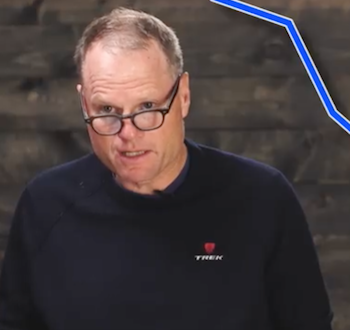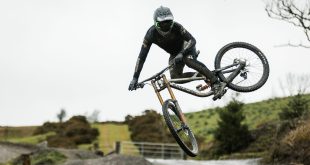Trek Bicycles CEO John Burke has sent a video to the company’s US dealers confirming that demand for bikes is soft, but that he’s confidant that sales will rise again because of health reasons, trail building and e-bikes. He also explained why Trek has been acquiring ageing or failing bike shops and turning them into Trek stores.
While he was referring to the US market (analysts believe Trek could own more than 200 stores in North America within a few years) the family-owned company is also employing the same tactic in the UK. Today the company has reopened Full Gas Bikes, which was started in 2016, as Trek Bicycle Store Sheffield Fox Valley. This joins Trek’s other company-owned stores in Wilmslow, Manchester, Milton Keynes and Shrewsbury.
“Trek’s interest in retail really revolves around two things – number one is addressing markets where we have no retailers or very low [market] share,” said Burke.
He also confirmed that Trek is interested in taking over existing stockists so it can control the brand experience.
“A lot of our longtime awesome partners are looking to get out of the business. [Some] people have been Trek retailers for 20 or 30 years and getting to 60 or 65 years old they want to get out of the business, but haven’t been able to sell. [They] call Trek – we don’t have a lot of options here, we’re looking at closing or we’re looking at doing something [with them].
“There are some significant markets that unless we stepped in and bought these retailers … we would have been out of [that market]. We will make moves to make sure that we’re properly represented in markets.”
Burke said a strong Trek – even one which owned loads of retailers – was in the interests of those IBDs not yet vacuumed up.
“It is in your best interest to have a strong healthy Trek because Trek has been so successful in the US market we’re able to offer you incredible services.”
Cycle retail is currently suffering from a downturn globally. BikeBiz estimates that UK bike shop closures are now at their highest rate since the 1960s, and 2017 will see 1 million fewer bikes sold than in 2016.
Burke confirms that the US market is also down.
“2016 was not a great year in the bike business, and 2017 has not been either,” he said. “We’ve seen declining sales, and from our numbers it’s about down three and a half percent, so if you’re worse than three and a half percent you’re losing, [but] if you’re better than down three and a half percent in today’s market you are winning.”
One of the biggest reasons for the dip is the collapse in the road bike market, which is the US is down by nearly 13 percent year on year.
Sales are also depressed because of the public perception that cycling is dangerous, said Burke.
“If you take a look at social media’s impact on the bike business whenever there’s a safety accident it reaches a lot more people today than they used to reach five years ago or ten years ago. [There’s] a perception about cycling not being safe and that’s had an impact on the business.”
He also blames screen-time.
“If you take a look at kids, if you take a look at adults playing with their phones – and you got all sorts of other screens you got Netflix, you got entertainment – people are spending more time looking at screens and less time outside riding bikes.”
However, he’s a glass-half-full kind of guy.
“I think that there’s some significant reasons why I think the bike business is going to turn around,” he said, although he wasn’t sure when this would be.
“In the next few years I see the bike business growing and there’s a couple of reasons for that. The first thing is fitness. If you take a look, especially here in the United States, our healthcare costs continue to go up and the results are the worst in the world. Sooner or later some genius is going to figure out that the simple solution to our healthcare situation is to get people active and when that happens I think that’s gonna be great for cycling.
“The second reason to be optimistic about the bike business is e-bikes. Our e-bike business is booming and I think it’s only gonna get better.
“If you go to Holland and you go to Germany over the last 10 years [the e-bike market has] continued to grow every single year. I don’t think we’re close to seeing what e-bikes can do in the market.”
His third reason for optimism is the growth of trail networks, off-road as well as protected cycleways in towns and cities.
“If you take a look at all the trails that have been built in the last 20 years it’s amazing. Counties, cities and states continue to invest more in cycling infrastructure. As you add trails those trails start to connect it makes cycling safer, and when we make cycling safer more people ride bikes.”
He’a also a huge fan of the National Interscholastic Cycling Association, an American non-profit organisation that promotes high school mountain biking programs.
“NICA is gonna be one of the big stories over the next 10 to 15 years,” Burke reminded retailers.
“NICA started out in Northern California and it has spread to 20 states. Wisconsin started three years ago with 200 kids, then 400 kids, then 600 kids. Today there are 10,000 riders. I think by 2030 there could be over 200,000.”
He concluded: “Those are just a few reasons to be optimistic about what’s going on in the bike business. I think there really are some positive signs.”
 BikeBiz Bicycle and cycling retail news
BikeBiz Bicycle and cycling retail news




